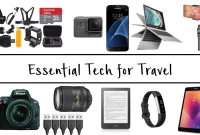When embarking on impactful journeys, selecting the right gear is crucial. In the article “Traveling with Purpose: Selecting Gear for Impactful Journeys,” we explore how choosing the right equipment can enhance your travel experience while making a positive difference in the destinations you visit.
Gear for Voluntourism and Philanthropic Trips

When embarking on a voluntourism or philanthropic trip, it is important to pack the right gear to ensure a smooth and impactful journey. Here are some essential items to consider:
1. Comfortable Clothing and Footwear
Invest in lightweight and breathable clothing that is suitable for the destination’s climate. Pack versatile pieces that can be layered for changing weather conditions. Don’t forget to bring sturdy and comfortable footwear for long hours of walking or hiking.
2. Travel-Sized Toiletries
Opt for eco-friendly and travel-sized toiletries to minimize waste. Look for biodegradable options to reduce your environmental impact. Don’t forget essentials like sunscreen, insect repellent, and a reusable water bottle.
3. First Aid Kit
A well-stocked first aid kit is essential for any trip. Include bandages, antiseptic wipes, pain relievers, and any necessary prescription medications. Also, consider packing items such as water purification tablets and oral rehydration salts for emergencies.
4. Sustainable and Ethical Travel Products
Support local communities by choosing sustainable and ethical travel products. Look for fair-trade items, eco-friendly alternatives, and products made by local artisans. By purchasing these goods, you can contribute to the economic growth of the community.
5. Reusable and Eco-Friendly Gear
Reduce your environmental impact by opting for reusable gear such as a travel mug, utensil set, and shopping bag. Avoid single-use plastic items whenever possible and choose sustainable alternatives like bamboo cutlery or stainless steel water bottles.
6. Language Guide or Translator App
Maximize your engagement and interaction with local communities by learning a few key phrases in their language. Bring along a pocket-sized language guidebook or download a translator app to bridge the communication gap.
7. Camera and Notebook
Document and reflect on your journey by packing a camera and a notebook. Capture special moments and record your thoughts and experiences along the way. This will allow you to revisit your trip and share your story when you return.
Remember, while gear is important, the most crucial aspect of voluntourism and philanthropic trips is the positive impact you can make on the communities you visit. Choose gear that aligns with your values and enhances your ability to connect and contribute.
Packing for Educational and Cultural Exchanges
Embarking on an educational and cultural exchange is an exciting and enriching experience. To make the most of your journey and ensure you have everything you need, it’s important to pack thoughtfully. Here are some tips for selecting gear that will enhance your impactful journey.
Essential Documents
Prioritize packing essential documents such as your passport, visa, tickets, and identification cards. It’s also wise to make copies of these documents and store them separately.
Adaptable Clothing
When packing clothes, consider the climate and cultural norms of your destination. Opt for versatile, comfortable clothing that allows you to move freely. Research local customs to ensure you dress appropriately in different situations.
Technology and Communication
In today’s interconnected world, staying connected is crucial. Pack your smartphone, laptop, or tablet along with the necessary adapters and chargers. Additionally, consider bringing a portable Wi-Fi device to ensure you have internet access wherever you go.
Learning Materials
Bring along any learning materials specific to your educational program or cultural exchange. These materials can include textbooks, language guides, notebooks, and pens to support your studies and help document your experiences.
Comfort and Safety
Prioritize your comfort and safety by packing essentials such as a good pair of walking shoes, a first aid kit, insect repellent, and any necessary medications. It’s crucial to take care of your health while immersing yourself in new environments.
Sustainability and Respect
While traveling, it’s important to be conscious of the impact you have on the environment and local communities. Pack reusable items such as a water bottle, reusable shopping bag, and utensils. Respect local customs and traditions, and try to minimize your waste wherever possible.
By packing with purpose and considering these tips, you’ll set yourself up for a successful and impactful journey. Remember to prioritize the experiences and connections you’ll make, and embrace the opportunity to learn and grow through educational and cultural exchanges.
Essentials for Eco-Conscious Travelers
When embarking on impactful journeys, it is important for eco-conscious travelers to carefully select their gear. By choosing sustainable and eco-friendly options, travelers can minimize their environmental footprint and contribute to the preservation of our planet. Here are some essential items that should be a part of every eco-conscious traveler’s packing list:
1. Reusable Water Bottle
Plastic waste poses a significant threat to our oceans and wildlife. Opt for a durable and refillable water bottle to reduce the amount of single-use plastic bottles consumed during your trip. Look for bottles made from BPA-free materials like stainless steel or glass.
2. Eco-Friendly Toiletries
Switch to eco-friendly toiletries to reduce plastic packaging waste. Choose biodegradable soaps, shampoos, and toothpaste wrapped in recycled or compostable materials. Additionally, consider using solid toiletries instead of liquid versions to minimize the use of plastic bottles.
3. Sustainable Clothing
Pack clothing made from sustainable and ethically sourced materials, such as organic cotton, hemp, or bamboo. These materials have a lower environmental impact compared to conventional cotton or synthetic fabrics. Avoid overpacking and choose versatile clothing items that can be mixed and matched.
4. Eco-Friendly Travel Bag
Invest in a travel bag made from sustainable materials like recycled polyester or natural fibers. Look for brands that prioritize fair trade practices and produce bags with minimal environmental impact.
5. Solar-Powered Charger
Reduce reliance on electrical outlets by bringing a solar-powered charger for your electronic devices. This way, you can harness the power of the sun to charge your phone, camera, or other gadgets, without contributing to carbon emissions.
6. Responsible Souvenirs
Avoid purchasing items made from unsustainable materials or supporting businesses that exploit wildlife or natural resources. Instead, opt for locally made products that support local artisans and communities.
By packing these essentials, eco-conscious travelers can make a positive impact on the environment while enjoying their journeys. Remember, small choices can lead to significant changes, so let’s travel responsibly and protect the planet we love.
Documenting Social Impact Travels
In today’s world, many travelers are seeking more than just a typical vacation experience. They want their journeys to have a positive impact on the communities they visit. This desire has given rise to a new trend known as social impact travel.
Social impact travel involves engaging in activities that support local communities and contribute to sustainable development. It goes beyond merely being a tourist and instead focuses on creating meaningful connections and leaving a positive mark on the places visited.
Selecting Gear for Impactful Journeys
When embarking on a social impact travel adventure, it’s important to consider the gear you bring along. Here are some essential items to pack:
- Reusable Water Bottle: This simple yet effective item helps reduce plastic waste and supports sustainability efforts.
- Eco-Friendly Toiletries: Opt for biodegradable and environmentally friendly options to minimize harm to the destinations you explore.
- Reusable Shopping Bag: Carrying a foldable shopping bag encourages responsible shopping practices and reduces the need for single-use plastic bags.
- Camera with Storytelling Capability: Documenting your trip helps raise awareness about social issues and showcases the positive impact of travel on vulnerable communities.
- Supportive Footwear: Be sure to wear comfortable shoes suitable for various terrains. Sometimes, the best way to make a difference is by engaging in physical activities such as volunteering or participating in community projects.
- Languages App/Dictionary: Communication is key when connecting with locals. Utilizing language apps or carrying a dictionary can facilitate meaningful interactions and cultural exchanges.
Remember, the goal of social impact travel is to bring about positive change. Choosing the right gear can enhance your ability to engage with local communities and make a lasting impact.
Balancing Comfort and Functionality
When embarking on impactful journeys, it is essential to select gear that strikes a fine balance between comfort and functionality. Traveling with a purpose often means encountering different terrains, climates, and challenges, requiring gear that can adapt and perform optimally while also ensuring your comfort throughout the journey.
Prioritize Lightweight and Versatile Gear
One of the key factors to consider when selecting gear for impactful journeys is its weight and versatility. Carrying heavy and bulky items can hinder your mobility and add unnecessary strain. Opting for lightweight gear not only frees up your energy but also allows for easier transportation, whether it’s hiking through rugged trails or navigating crowded airports. Look for multi-functional items that serve multiple purposes, such as a lightweight scarf that can double as a beach towel or a compact sleeping bag that also acts as a blanket.
Choose Durable and Weather-Resistant Materials
Exploring new places often means unpredictable weather conditions. It is crucial to invest in gear made from durable and weather-resistant materials that can withstand the elements. Waterproof backpacks, quick-drying clothing, and moisture-wicking socks are a few examples of gear that can keep you comfortable and well-prepared, regardless of the weather. Ensure your gear is reliable and able to withstand the wear and tear of constant use, so it lasts throughout your journey.
Consider the Ergonomics of Your Gear
Comfort should never be compromised, especially when you’re on the go for an extended period. Ergonomics plays a significant role in ensuring your gear is comfortable and functional. Look for items with adjustable straps, padding at pressure points, and proper weight distribution. Backpacks with ergonomic designs and shoes that offer good arch support are just a couple of examples of gear that prioritize your comfort during long walks or hikes.
Pack Mindfully and Minimize Excess
When it comes to impactful journeys, it’s important to pack mindfully and avoid overburdening yourself with unnecessary items. Prioritize essentials and items that serve multiple purposes. Consider versatile clothing that can be easily mixed and matched, and only pack what you truly need. Minimizing excess not only lightens your load but also allows for more efficient travel and reduces the environmental impact of your journey.
In conclusion, selecting gear for impactful journeys requires finding the right balance between comfort and functionality. By prioritizing lightweight and versatile gear, opting for durable and weather-resistant materials, considering the ergonomics of your gear, and packing mindfully, you can ensure a more enjoyable and impactful travel experience.
Ethical Considerations in Travel Gear
When embarking on impactful journeys, selecting the right travel gear goes beyond convenience and functionality. By taking ethical considerations into account, we can ensure that our choices align with our values and have a positive impact on both local communities and the environment.
Sustainability
One crucial aspect to consider is the sustainability of the travel gear. Opt for products made from eco-friendly materials such as recycled or organic fabrics. Look for certifications like Fair Trade or Bluesign that guarantee responsible production processes.
Fair Trade and Local Artisans
Supporting local communities is another essential consideration. Choose brands that engage in fair trade practices and source their products from local artisans. This helps to empower local economies, preserve traditional craftsmanship, and foster cultural appreciation.
Animal Welfare
Travel gear often includes products made from animal-derived materials. Ensure that these materials are sourced ethically and cruelty-free. Look for alternatives to leather and fur, such as faux leather or plant-based fabrics that provide the same functionality without supporting animal exploitation.
Minimalism and Durability
Adopting a minimalist approach to travel gear not only helps reduce our environmental footprint but also promotes durability. Choose versatile items that serve multiple purposes and are made to withstand the test of time. Investing in high-quality gear reduces waste and emphasizes longevity.
Carbon Footprint
Consider the carbon footprint associated with the manufacturing and transportation of your travel gear. Seek out brands that prioritize sustainable production methods and support local manufacturing to minimize emissions. Additionally, choose lightweight gear to reduce the energy required for transportation.
Community Engagement
Some travel gear brands actively give back to the communities they operate in. Look for companies that donate a portion of their profits to local initiatives or support social causes. By purchasing from these brands, you can contribute to positive social change.
By taking into account these ethical considerations when selecting our travel gear, we can ensure that our journeys leave a positive impact on both the places we visit and the people we meet along the way.
Conclusion
In conclusion, when embarking on impactful journeys, it is crucial to select the right gear that aligns with your purpose. Consider opting for sustainable and ethically produced products that minimize environmental impact. Additionally, choose versatile and durable gear that can withstand various conditions while maintaining functionality. By being mindful of your gear choices, you can contribute to responsible and sustainable travel.



